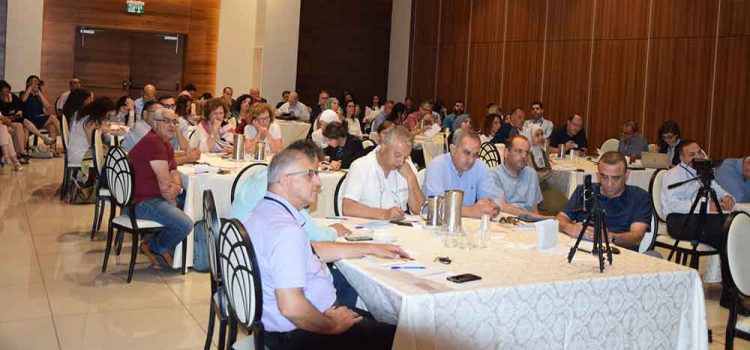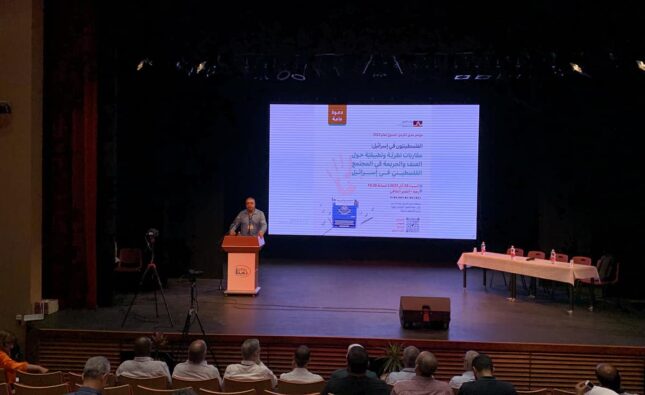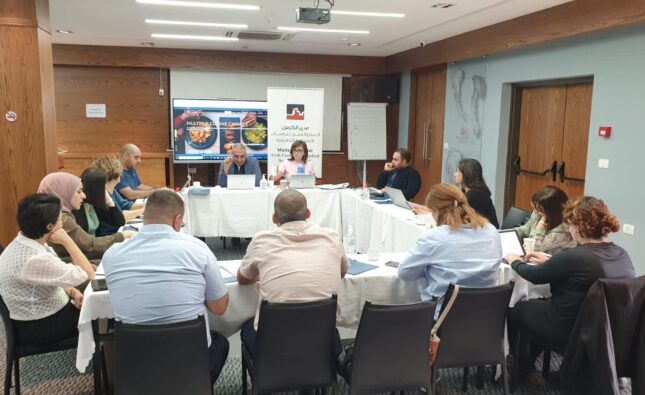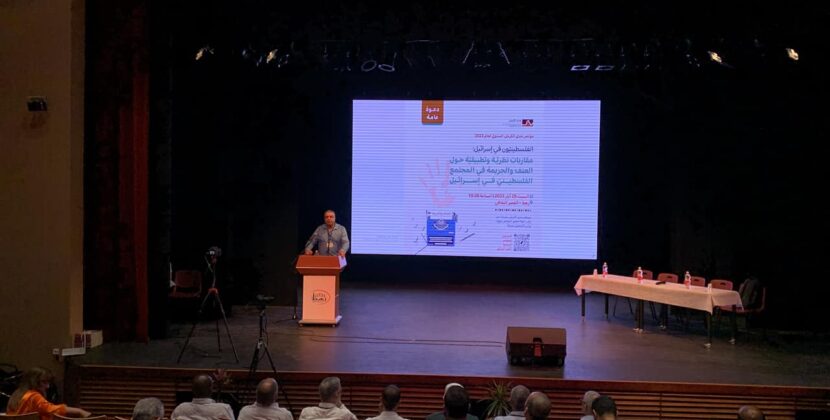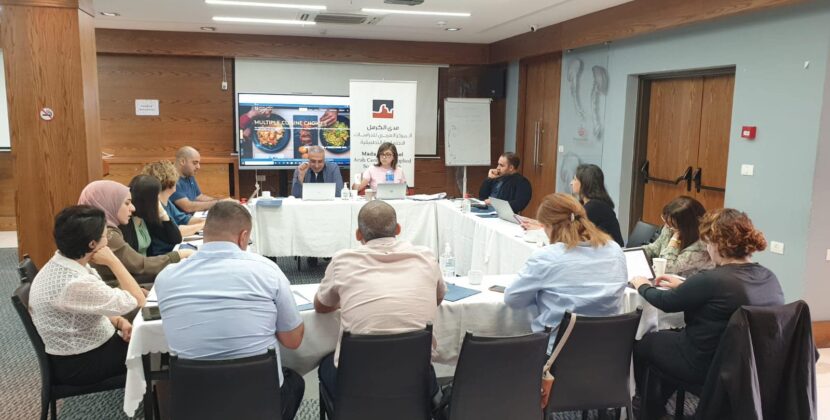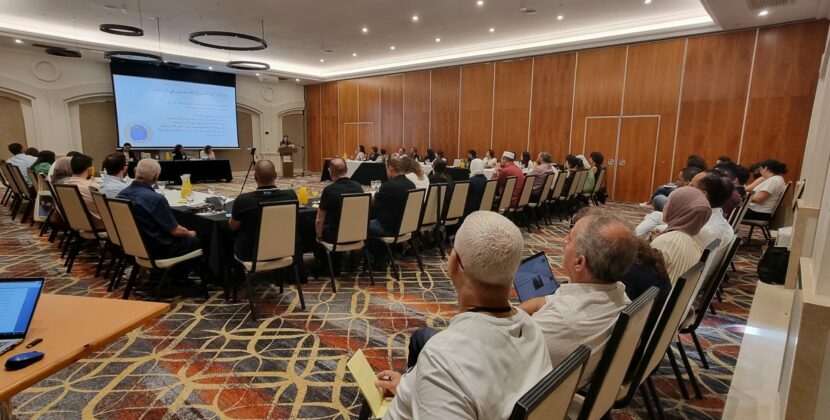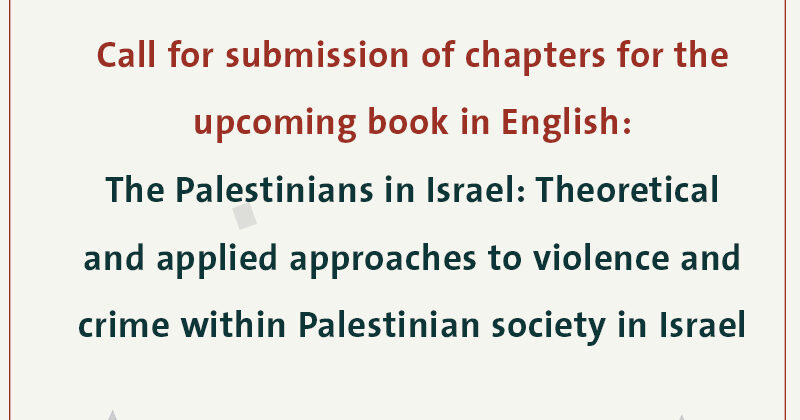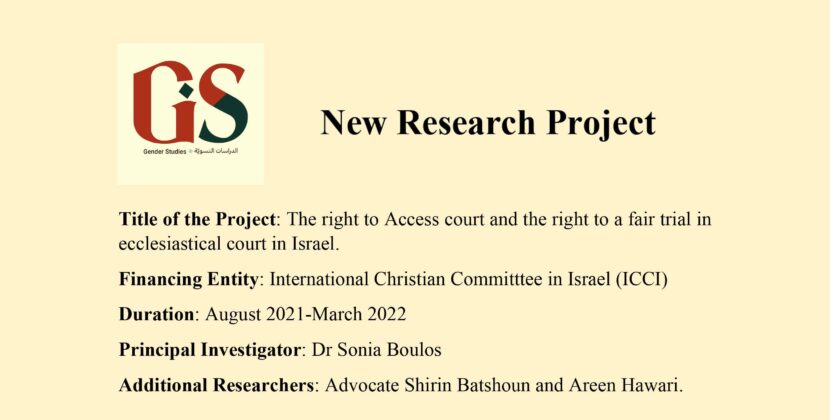On June 22, 2019, Mada al-Carmel – The Arab Center for Applied Social Research – held its annual academic conference in Nazareth entitled “Transformations in Political Participation in the last Two Decades and a Glance Towards the Future.” Dozens of academics, university students, politicians and activists participated in the conference. The conference included academic presentations based on research papers presented to the conference.
The conference was opened with a welcoming opening session, moderated by Ms. Einas Odeh- Haj, the Associate Director of Mada al-Carmel. Ms. Odeh- Haj stressed the importance of the conference and its theme in the current political situation, stating that the recent parliamentary elections and the decline in voting percentages has reaffirmed the need for a collective political project where the joint list would be at its core and the parliamentary action would be one of its constituents. Mr. Mohammad Barakeh, Head of the Higher Follow-up Committee for the Arab Citizens of Israel, gave a short speech in which he pointed out the importance of the meeting between politicians and academics in scientific conferences, stressing the role of the Follow-up Committee and the founding steps it has taken in recent years. Mr. Mudar Younis, Mayor of Arara, and Chair of the National Committee of Arab Local Authorities, also spoke about the advantages of local politics and local leadership transformations in local governance. He indicated that despite the positive changes in the qualities of local leaders on a personal level, they still rely on the traditional bases in the local elections. The last speaker of the session, Dr. Johnny Mansour, member of Mada al-Carmel’s board, welcomed the attendants reaffirming the importance of the papers to be presented at the conference, the value of the dialogue resulting from such conferences and the role of Mada al-Carmel in approaching the Palestinian political reality with academic tools that benefit the community and political leadership. As well as the relevance of the conference as an academic forum in Palestinian society to discuss its affairs.

After the opening, the first session of the conference was moderated by Ms. Areen Hawari, a researcher at Mada al-Carmel. Dr. Ameed Saabneh, a lecturer at Haifa University and a member of the research committee at Mada al-Carmel, presented his analytical paper on the opinion poll conducted by Mada al-Carmel on political participation. Dr. Saabneh analyzed the attitudes of the Palestinian public through a socio-economic approach, indicating that there are two major trends within the Palestinian society: the collective approach, which sees the organization of Palestinian society as the most important formula for improving the status of the Palestinians; and the individualistic approach which favors integration in Israeli society. He pointed out that the higher the educational level of the individual, the higher the tendency for the collectivist approach. This is contrary to the prevailing impression that the Palestinian middle class tends towards integration and assimilation in the Israeli society.
Professor Mohammad Amara, a lecturer at the Beit Berl Academic College, commented on Dr. Saabneh’s paper by saying that there is a need to take the Israeli political context and its changes in the past decade into consideration when interpreting the survey results, and not to be satisfied with just the class or economic educational approaches. Dr. Mtanes Shehadeh, Knesset member from the Alliance of the National Democratic Assembly and the United Arab List (Balad-Ra’am), said that the poll explains much of the political behavior of the Palestinian society in the recent elections. This is because the people see parliamentary action as an important political option, but it sees collective action as an option that must accompany the parliamentary option, including the organization of the society outside the parliament.

The second session, which was moderated by Dr. Hanin Majadele, a lecturer at the Al-Qasemi Academic College of Education, discussed the subject of political organization. Dr. Mohanad Mustafa, General Director of Mada al-Carmel, presented his paper on the political organization among the Palestinians in Israel between the policies of hope and cynicism. He explained that the policy of hope is reflected in three points; collective political action, collective political organization and the development of a collective political project. The more society advances in achieving these three demands, the more hope people have, and their political participation and involvement with politics increases, and vice versa..
First discussant, Mr. Muhammad Khalayleh, a PhD student at Haifa University, commented on the paper by saying that there is a decline in the public’s trust in the various political institutions in Palestinian society, which confirms the policy of cynicism, stressing that the future vision documents (issued by the Palestinians in Israel more than a decade ago) were not translated into collective political action after they were published, as they remained elitist perceptions that did not reach the general public. Aida Touma-Suleiman, Knesset member from the Alliance of the Democratic Front for Peace and Equality and the Arab Movement for Change (Hadash-Ta’al), pointed to the need to give hope to people by reforming the Joint List. The List had comprised a policy of hope for people when it was established in 2015, and there is a need to develop a discourse that addresses people’s expectations from the Joint List.

The last session was moderated by the activist and lawyer Ali Haider. Dr. Hunaida Ghanim, director of the Madar Center for Israeli Studies, presented her paper which addressed the Palestinian political discourse since the publication of the future vision documents. Dr. Ghanim referred to the dialectic of nationality and the homeland, the changes in Israeli society and their impact on the Palestinians in Israel and their behavior and political thought, particularly the rise of the national-religious discourse in Israeli politics.
Mr. Awad Abdel Fattah from the Campaign for One State and the former General Secretary of the National Democratic Assembly, commented on the paper stressing the importance of rethinking the approach of Israel as a settler-colonial state. Finally, Dr. Mansour Abbas, the head of the Balad-Ra’am Alliance, commented on the paper by saying that it was essential to adopt a political and parliamentary discourse that addresses the current political reality, even if this necessitates connecting with new sectors of Israeli society and building partnerships with them in order to advance the interests of the Palestinian society.
It should be noted that the conference booklet, which included the papers presented at the conference, was distributed to the attendees. The conference was funded by Rosa Luxemburg Stiftung, and was prepared by an academic committee composed of Dr. Muhannad Mustafa, Ms. Einas Odeh-Haj, Dr. Ameed Saabneh and Dr. Rawia Abu Rabia.






